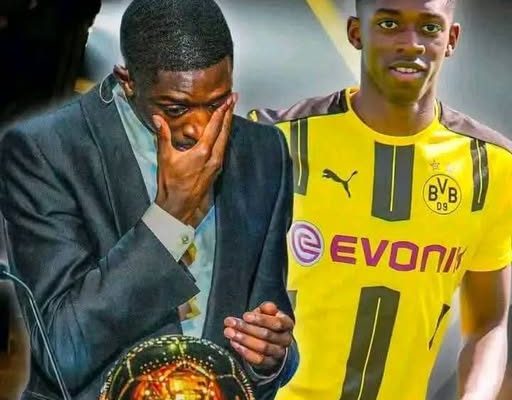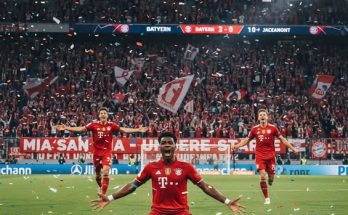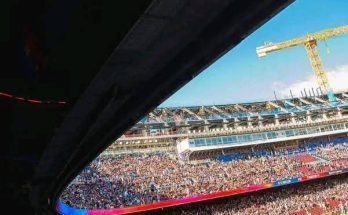The story began as a whisper in the corridors of European football, a tantalizing rumor that a “secret clause” would enrich Borussia Dortmund the day Ousmane Dembélé reached the pinnacle of individual glory. Now it’s detonated into reality. With Dembélé’s Ballon d’Or triumph, Dortmund is reportedly collecting a torrential windfall—millions flooding into the coffers, a financial earthquake recalibrating their future. The idea that a single clause negotiated years ago could unleash a cascade of wealth—rewriting BVB’s destiny and rattling power balances across the continent—is no longer fantasy. It’s happening.
To understand the scale of the jackpot, we must travel back to the moment Dembélé first left Dortmund. In 2017, when Barcelona signed him, the deal included massive add‑ons: Barcelona agreed on a base €105 million plus performance-related variables of up to €40 million. Among those variable clauses: extra payments tied to the number of matches played, Champions League participation, and ostensibly other team and individual achievements.One of these rumored variables has long been speculated to be a Ballon d’Or clause.
When Dembélé finally won the Ballon d’Or in 2025, that secret clause would trigger automatically. In effect, Borussia Dortmund had positioned itself to profit not only from his transfer but from his individual success. And now, with the clause activated, BVB is collecting what some outlets already call “an incredible rain of money” so forceful it could transform their financial trajectory overnight.
This is no mere bonus or token gesture. We’re talking nine‑figure potential. Some reports have speculated that, combined with other performance variables, the trigger could net Dortmund tens of millions more—a fiscal windfall that few clubs of their stature have ever secured from a single player’s individual honor. It’s as if Dortmund planted a financial time bomb when they let Dembélé go—and now it has exploded in their favor.
Already, whispers across Europe suggest this could be the most lucrative “jackpot” clause in football history. Rival clubs are stunned. Legends of contract engineering and cunning negotiation are whispering through boardrooms. Imagine: a mid-tier (or even high-tier) club constructing a clause so powerful that it pays off years later when a player reaches individual ascendance. That sort of foresight rewrites the playbook.
But the consequences go deeper. For Dortmund, this windfall means more breathing room—a chance to invest in youth, infrastructure, or marquee transfers they might never have afforded. The club that is known for prodigal scouting and punching above its weight suddenly has a slush fund many peers would envy. It changes their calculus: no longer must they gamble solely on undervalued gems; now they might compete for superstars while retaining resilience.
From a symbolic standpoint, it flips power. Too often, big clubs poach rising talent and collect the upside. Here, Dortmund not only reaped the upside of Dembélé’s sale but now collects again on his crowning achievement. The power dynamic between selling and buying clubs subtly shifts. Other clubs will study this move and perhaps copy it: build in “future glory” clauses into contracts, protect the club’s share of a player’s eventual fame.
For the rest of Europe, the shockwaves are immense. Scouts, agents, and clubs will reassess the worth of add‑ons, especially those tied to individual accolades. Negotiations will become more intricate. The standard add-on for appearances may soon be joined by clauses for Ballon d’Or, Golden Boot, best player honors. The ceilings of what a club can recoup for talent will rise. The competitive balance is disturbed: clubs with the foresight to bind those clauses will enter the next decade in vastly stronger positions. The divide between well-managed mid-tier clubs and top heavies will widen further.
Of course, skeptics will ask: is this too speculative? Are we overestimating the potency of such clauses? But the signs are already there. Press outlets reporting “Dembélé add-ons: Dortmund almost guaranteed €20 million” highlight that two payments were almost assured—one once he reached 50 matches, another if Barcelona qualified for the Champions League. (Sport.es) Some indications even suggest that one of the variables in Dembélé’s original deal was explicitly tied to winning the Ballon d’Or. (Sport.es) Meanwhile, in more recent transfers, rumors swirl about “secret clauses” in his PSG contract: Le 10 Sport has asserted that Dembélé negotiated a Ballon d’Or clause when he joined PSG in 2023. (Le10Sport) If true, this kind of layering compounds the windfall effect.
To the uninitiated, all of this might seem intrusive or mercenary—but in top‑level sport, foresight and risk management are everything. And Dortmund pulled off a masterstroke: preserving upside on a player they no longer retained, but whose potential would blossom far beyond immediate metrics. Dembélé’s successes become Dortmund’s successes again.
Consider the narrative: years ago, Dortmund sold Dembélé and captured most of his economic value. But the fans, the club identity, even the pride of discovering him stayed. Now, this secret clause binds his destiny to theirs. When he outshines everyone, it finally pays them back in cold, hard cash. It’s poetic revolution: the artist’s triumph elevates his original home.
Importantly, this is not just theory. Reports already suggest that Dortmund is cashing in right now. Some outlets are framing it as an “incredible rain of money” into BVB’s box offices. The optics alone matter: sponsors, investors, the market all take notice. Suddenly Dortmund is not just a smart sporting organization—they become a case study in financial alchemy. Their valuation rises; their brand multiplies.
Among Europe’s elite, panic brews. How many clubs neglected to think this far ahead? How many allowed gifted players to leave without securing their share of future individual success? The next wave of contract negotiations will be dominated by legal teams arguing over triggers, ceilings, retroactivity, interpretive definitions (“what exactly constitutes winning the Ballon d’Or,” “must it be in the same league or worldwide,” “does it count if tied,” “does it rely on voting ballots or statistical awards”). Contracts will balloon in complexity. The rights and responsibilities of players, agents, and clubs will be recast.
Even UEFA and FIFA will take notice. Regulations on contractual clauses may come under increased scrutiny. Is it fair for smaller clubs to be shut out if they lack the bargaining power to insert such mega clauses? Will there be limits placed on add-ons tied to individual awards? If clubs begin to standardize clauses that effectively guarantee major windfalls, regulators may feel compelled to intervene to preserve competitive fairness.
Yet Dortmund is already ahead. The club that once played the role of selling springboard for talent now transforms into profit center for individual triumphs. They can attract players by offering transparency: “even after you leave, we share your glory.” They can outbid rivals not in short periods but in long arcs. They create a reputation for rewarding success—not just at their club but beyond it.
For the players, this changes incentives. A young star might now think: “If I sign to a smaller club that includes these clauses, I can be part of their success and benefit if I ascend.” The alignment shifts: player and club less adversarial, more of a long‑term partnership oriented toward mutual upside. The rare exception becomes the norm: contracts with future‑glory protections built in.
And for Dortmund, this injection of capital is more than just symbolic—it can underwrite competitive revival. They can invest in infrastructure, training facilities, and talent pipelines. They can be more ambitious in transfers, raise wages to retain emerging stars, and improve their stadium or global brand. In short, they can leapfrog from “clever underdog” to “smart powerhouse.” The clause’s payout could be the capital seed for a generational project.
This is a turning point. Some will remember Bayern, Real Madrid, Manchester City or PSG as dominant. But others will remember the day when Dortmund turned a single Ballon d’Or clause into a multi‑million roar. Across Europe, clubs will scramble to adjust, replicate, litigate. Agents will fight over the interpretation of clauses. Leagues will adapt regulations. The tectonic plates of football finance will shift.
In years to come, this Dembélé clause might be legendary. Analysts will study it in business schools. Clubs will cite it as precedent. It may become a blueprint for how smaller clubs protect future upside—and how the sale of talent need not be a one‑way loss. The story is still unfolding, but already it reads like a myth: the player they sold still pays them in gold. And in football’s mercenary world, that is the sweetest revenge.
So when the next Ballon d’Or winner is handed his trophy, keep your ears open. It may be Dortmund—or any club cunning enough—collecting the true prize from that moment onward. The rain of money has poured into BVB. Across Europe, the ground is shaking.



